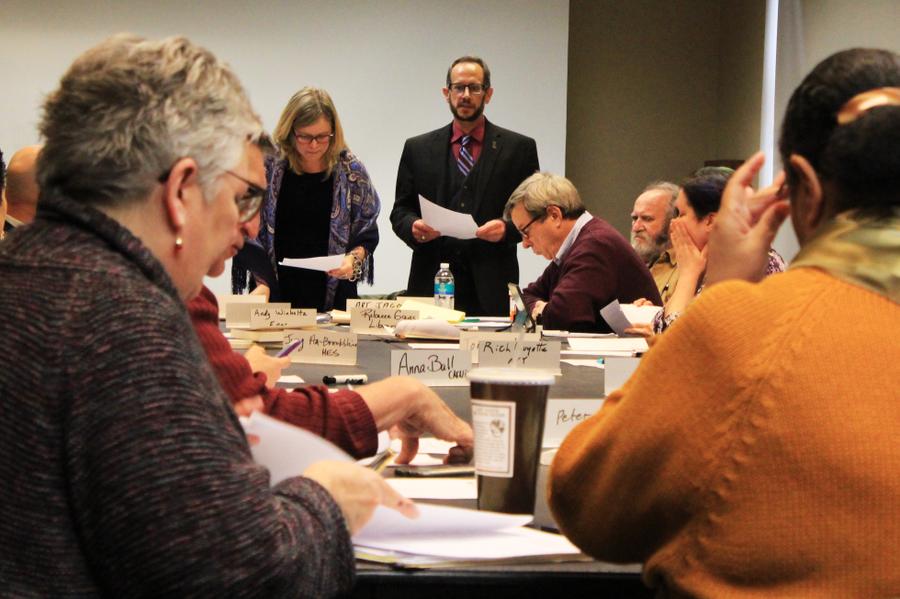
Faculty Council focused on a proposed resolution to examine the relationship between MU and the UM system during its first meeting of the year Thursday.
####Proposed Resolution
Art Jago, management professor and Student Affairs Committee chairman, presented the [proposal](http://facultycouncil.missouri.edu/meetings/attachments/2015-16/2016-01-21/fc-mu-um-resolution.pdf) to the council.
“In the 53-year history in the University of Missouri System, this is the only time both the presidency of the system and the chancellorship of MU have been vacant at the same time,” Jago said. “We should view this as an opportunity to reassess the relationship between the system and our campus.”
The proposal suggests an examination of the organizational structure of the UM System, the relationship between MU and the UM System and a possible consolidation of the offices of the UM System president and MU chancellor.
Jago said this would be an opportunity to examine the role the UM System plays across all four campuses and determine what value the system provides the four schools.
According to the proposal, if value can be identified, then the UM System should consider expanding to include other public Missouri schools such as Missouri State and Truman State to better serve the taxpayers. The proposal also stated, however, that it may be more academically efficient to disband the UM System due to differences between the four campuses.
The proposal cited other universities that are not part of a system as well as schools that are part of a system but have one individual who is both chancellor of the flagship school and president of the university system.
Jung Ha-Brookshire, associate professor of textile and apparel management, said she felt it was important to evaluate what values MU and the UM System can offer each other.
“What role is (the) system supposed to play?” Ha-Brookshire asked. “They’re supposed to be a support function, but somehow they are dictating academics … so what value is (the) system supposed to play?”
Other faculty members discussed the language of the proposal and suggested that some of the wording be changed to be less vague.
The proposed resolution will be voted on at the Feb. 11 meeting.
####Library
Ann Riley, interim director of MU Libraries, and Rabia Gregory, chairwoman of the Library Committee and associate professor in religious studies, spoke to the council about library funding.
Due to the failure of the library fee in November, the libraries will be cutting their budgets.
“We do have significant budget challenges ahead,” Riley said.
Gregory and Riley said they were unsure of the libraries’ budget for the next year, but are hoping through fundraising, they will not have to cut the budget for electronic journals. Due to monopolies, however, costs for journals are often high and there has become a pattern of cutting books to fund journals.
According to a printed handout summarizing facts about the libraries, possibilities for the future include seeking increased general revenue allocation and continuing to shrink staff. Other options also include reducing hours and locations and increasing open access to cut costs.
####Faculty Representation
The current bylaws of the council state that there should be between 25 to 30 representatives on the council. The number of representatives on the council is determined by the full-time, tenure-track faculty in each division at a ratio of one to 50.
Due to the number of faculty for the 2016-17 school year, the College of Arts and Science and College of Agriculture, Food and Natural Resources will lose representatives, bringing the total number of council members to 24. Tony Lupo, Faculty Affairs Committee chairman and associate professor of atmospheric science, presented the proposal. Under the proposal, the divisor would change from 50 to 44, bringing the total number of representatives to 29.
“Twenty-nine is not an unusual number for council,” Vice Chairwoman Nicole Monnier said. “I think the more representatives around the table, the better.”
The council voted on and passed the proposal.
####Diversity Enhancement
Angela Speck, the Diversity Enhancement Committee chairwoman and associate professor of astronomy, gave an update to the campuswide diversity requirement that is in the process of being created.
“Obviously, the diversity enhancement last semester was enhanced,” Speck said. “A lot happened without much result, but the biggest thing we achieved is developing a campuswide diversity requirement.”
Speck said there are representatives from every college on a committee currently deciding what to include in the curriculum and are hoping to be finished by mid-February.
_Edited by Taylor Blatchford | [email protected]_